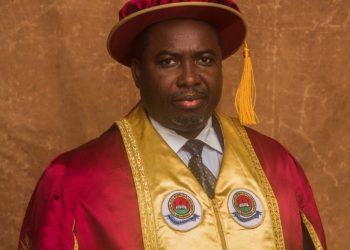…Malami insists on amendments
The Senate has resolved to appeal the judgement of Federal High Court, Umuahia, nullifying section 84(12) of the Electoral Act.
The resolution was reached after a debate at today’s plenary.
The resolution followed a motion titled: “Urgent need to appeal judgement of the Federal High Court Umuahia on suit no FHC/UM/CS/26/2022 on Section 84(12) of the Electoral Act, 2022.”
The motion was sponsored by Senator George Sekibo (Rivers East) and co-sponsored by 80 other lawmakers.
Justice Evelyn Anyadike, in a judgment, held that the Section of the Act was “unconstitutional, invalid, illegal, null, void and of no effect whatsoever”, adding that it cannot stand when it is in violation of the clear provisions of the Constitution.
Consequently, the court ordered the Attorney General of the Federation to “forthwith delete the said Subsection 12 of Section 84 from the body of the Electoral Act.”
Justice Anyadike in the Suit FHC/UM/CS/26/2022 held that Sections 66(1), 107(1)(f) of the 1999 Constitution already stipulated that appointees of government seeking to contest elections were only to resign at least 30 days to the date of the election.
According to her, any other law that mandates such appointees to resign or leave the office at any time before that was unconstitutional, invalid, illegal, null and void to the extent of its inconsistency with the clear provisions of the Constitution.
Some of the President’s ministers who are said to be planning to run for different offices include the Attorney-General of the Federation, Abubakar Malami, who is said to be eyeing the Kebbi State governorship seat; the Minister of Aviation, Hadi Sirika, who is believed to be planning to contest the governorship of Katsina State; the Minister of Transportation, Rotimi Amaechi, who is rumoured to be eyeing the Presidency.
Others who are said to have political ambitions include the Minister of Labour and Employment, Senator Chris Ngige; the Minister of State for Education, Chukwuemeka Nwajiuba; and a few others.
However, coming under order 42 of the Senate Standing Orders on Personal Explanation, Senator George Thompson Sekibo (PDP, Rivers East) during Tuesday’s plenary, challenged the judgment of the court on Section 84(12).
Citing Section 4 of the 1999 Constitution (as amended, Sekibo stated that the National Assembly is empowered by virtue of Its provisions to make laws for the peace, order and good governance of Nigeria.
He added that Section 228 lists such functions to include making laws to ensure internal democracy within political parties.
The section provides in part that, “the National Assembly may by law provide guidelines and rules to ensure internal democracy within political parties, including making laws for the conduct of party primaries, party congresses and party conventions; and the conferment on the Independent National Electoral Commission of powers as may appear to the National Assembly to be necessary or desirable for the purpose of enabling the Commission more effectively to ensure that political parties observe the practices of internal democracy, including the fair and transparent conduct of party primaries, party congresses and party conventions.”
He argued further that the provisions of Section 318 of the 1999 Constitution clearly defines who a public servant is, without including political appointees.
“I don’t have anything against the judge, but Mr President, what is relied on in the judgment is not in tandem with the interpretation of the Constitution.
“The Constitution defines for us who is a civil servant and who is a public servant. It does not include political appointees.
“More so, Section 4 gives us the power to make good laws, and in our mind, any law we make here is good law.
“Section 228 gives us also the power to make certain laws to guard the Independent National Electoral Commission to effectively discharge its functions.
“We felt that Section 84(12) as enshrined in the Electoral Act assented to, is for the interest of the people and country.
“I don’t think that somebody should go to court without joining the Senate or the House of Representatives where this law emanated from, because we are the origin of the law before the President assented to it.
“If you think it is faulty, you either take us to court and make us part of that case. We did not know, we were not told and they just went there and got a judgment, destroying our work for over one year as no one here has the head to do any good thing,” Sekibo had said.
Also. the House of Representatives is considering reporting Justice Evelyn Anyadike of a Federal High Court sitting in Umuahia, Abia State, to the National Judicial Council for nullifying the provisions of Section 84(12) of the Electoral Act 2022.
Justice Anyadike’s nullification thereby empowers the Minister of Justice and Attorney-General of the Federation, Abubakar Malami (SAN), to delete the section from the Act.
The House also resolved to appeal the judgement and have it upturned.
The lawmakers also asked Malami to allow the National Assembly to exercise its right to appeal the case.
Several members of the House, at the plenary on Wednesday, criticised the judiciary and the executive of usurping the powers of the legislature, stating that only the parliament and not a presidential appointee can amend the law.
The Speaker of the House, Femi Gbajabiamila, said he got to know about the case on the media.
He said he discovered that the chamber was not served any notice, since it was not a party to the suit.
Gbajabiamila said President Muhammadu Buhari was rightly advised to approach the National Assembly for amendment of the Act.
Speaker stated that he would not sit back and allow the parliament to be ridiculed under his watch.
Gbajabiamila said it was curious that the National Assembly was joined in the suit and the judgment was secured from a court in Umuahia.
The Speaker stated that the parliament must appeal the judgment and ensure that it was set aside. According to him, it is a mistake and the lawmakers must correct it.
Gbajabiamila appealed to the AGF to “tarry” and not take over the responsibility of the National Assembly.
The Senate had also on Tuesday resolved to take a decision on the matter today.
Section 84(10) of the Act reads, “No political appointee at any level shall be a voting delegate or be voted for at the convention or congress of any political party for the purpose of the nomination of candidates for any election.”
On Friday, Anyadike had held that the section was unconstitutional, invalid, illegal, null, void and of no effect whatsoever, saying it ought to have been struck out.
A lawyer and chieftain of Action Alliance (AA) Party, Nduka Edede, had approached the court, in the suit that had the Attorney-General of the Federation as the Defendant.
The Plaintiff had asked the court to determine whether Section 84(12), when read together with Sections 66(1)(f) 107(1)(f)(137(1)(f) and 182(1)(f) of the 1999 Constitution, was not inconsistent.
Malami had said his office would accordingly give effect to the court judgment in line with the dictates of the law and the spirit of the judgment.
The minister said, “The judgment of the Court will be recognised by the government printers in printing the Electoral Act.
“The Act will be gazetted factoring the effect of the judgment into consideration and deleting the constitutionally offensive provision accordingly.
“The provision of Section 84(12) of the Electoral Act 2022 is not part of our law and will be so treated accordingly.
“This is in line with the dictates of chapter 7, Part 4, Section 287 of the 1999 Constitution of the Federal Republic of Nigeria (as amended) on enforcement of decisions that make it a point of duty and obligation on all authorities and persons to have the judgment of the Federal High Court, among others, to be enforced.”
Meanwhile, the National Assembly had been divided over the ruling by a Federal High Court, Abuja, stopping President Muhammadu Buhari, Minister of Justice and Attorney-General of the Federation, Abubakar Malami (SAN); and the parliament from tampering with the Electoral Act 2022.
While the Senate had insisted on going ahead to consider the request by the President, who asked the federal parliament to delete Section 84(14) of the new electoral law, the House said it would obey the court.
President of the Senate, Ahmad Lawan, had stated that the ruling by the FHC negates the principles of Separation of Powers. The chamber had gone ahead to consider the executive bill for second reading and voted against it.
However, Chairman of the House Committee on Media and Public Affairs, Benjamin Kalu, while addressing journalists on Tuesday, argued that the chamber would obey the Rule of Law principle.
Buhari, while assenting to the Electoral Act 2010 (Amendment) Bill at the Presidential Villa in Abuja on February 25, had highlighted sections of the new law that would revolutionalise the electoral system in the country but expressed reservations about Section 84 (12).
The President had last week officially conveyed his reservation about Section 84 (12) of the Act 2022 to the National Assembly, asking the lawmakers to delete it.
Meanwhile, the Attorney-General of the Federation (AGF) and Minister of Justice, Abubakar Malami, on Wednesday in Abuja said his office would soon comply with the court order that he should expunge Section 84 (12) from the Electoral Act, 2022.
Addressing journalists after the virtual Federal Executive Council meeting, Malami said he would give effect to the judgment soon, adding that machinery had been set in motion for that purpose.
Asked about the progress on the court’s ruling, Malami said the process was still on.
He stated, “My clear response is the fact that truly there exists a court judgment. By the judgment, the court directed the office of the attorney-general to take necessary steps to delete the provision, which in essence implies that the provision should not form part of our laws.
“Whether it has been deleted or has not been deleted is indeed a function of agencies of government and associated relevant parastatals, but the true position of it in that respect is the fact that government printers, and indeed the Law Reform Commission, among others, that are responsible for the codification and gazetting of our laws, are working naturally with the office of the attorney-general to ensure that what goes into our laws are indeed in line with the provisions of the law.
“So what I am saying in essence is that it is indeed a work in progress against the background of the fact that the Law Reform Commission is involved statutorily, which is a parastatal under the office of the attorney-general, is a party to the process of codification. The government printers, which are saddled with the responsibility of gazetting our laws on the request of the office of the attorney-general, are equally involved.”
He noted that the possibility of an appeal was also there, adding that “deletion of Section 84(12) is a work in progress and is being considered as such.”















































